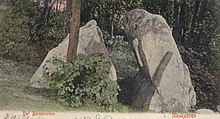Bristle stone
The bristle stone ( Russian Камень лжи Kamen lschi , " lying stone ") is a natural monument in the area of the city of Pionerski (German: Neukuhren ) in the Russian Oblast Kaliningrad in the valley of the Tschistaja (German: Salmon stream ). It is probably two boulders that were next to each other that were transported there during the Ice Age , i.e. not a single one that had burst .
A legend is associated with this stone, according to which a bride falsely swore her allegiance and thereupon lightning struck the stone and split it. As a result, perhaps as a means of raising children, the stone was viewed as a test object for convicting liars. Anyone who came through the approximately 70 cm wide gap without the stone closing again could be considered honest. There was also the following verse, which was painted in one way or another on the higher right stone about three meters high:
“The legend goes: The stone is crushed
anyone who lied; Dares
you get into the stone,
so it will soon be over. "
For inexplicable reasons the name Rübezahl was also applied to this stone .
Even in today's Russian times, the stone is known as the "stone of lies".
Web links
- The bristle stone on www.eastprussia.ru (Russian)
- Article about the bristle stone from class 1Б of grammar school No. 2 in Chernyakhovsk (Russian)
Individual evidence
- ^ Gerhard Dittrich: About bed load blocks in East Prussia in Ostdeutscher Naturwart, 4th year 1931/32, 5th issue, p. 200, online as a downloader at http://www.wmbc.olsztyn.pl/ [PDF file; 36.65 MB]. There are different views on this, but apparently no scientific investigation.
- ^ The bristle stone in Erich Pohl: Die Volkssagen Ostpreußens, p. 263
Coordinates: 54 ° 56 ′ 47 ″ N , 20 ° 12 ′ 32 ″ E
